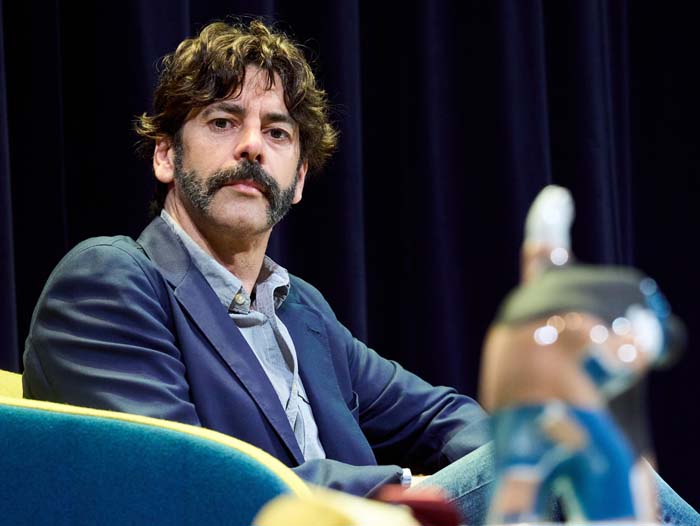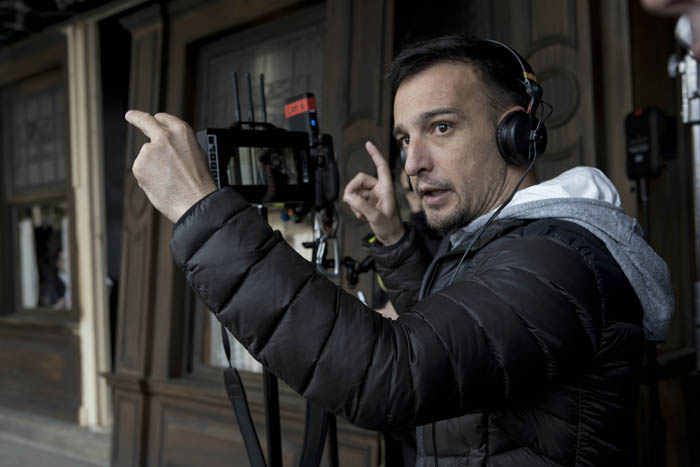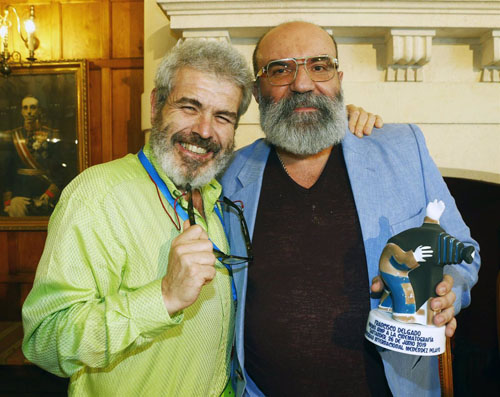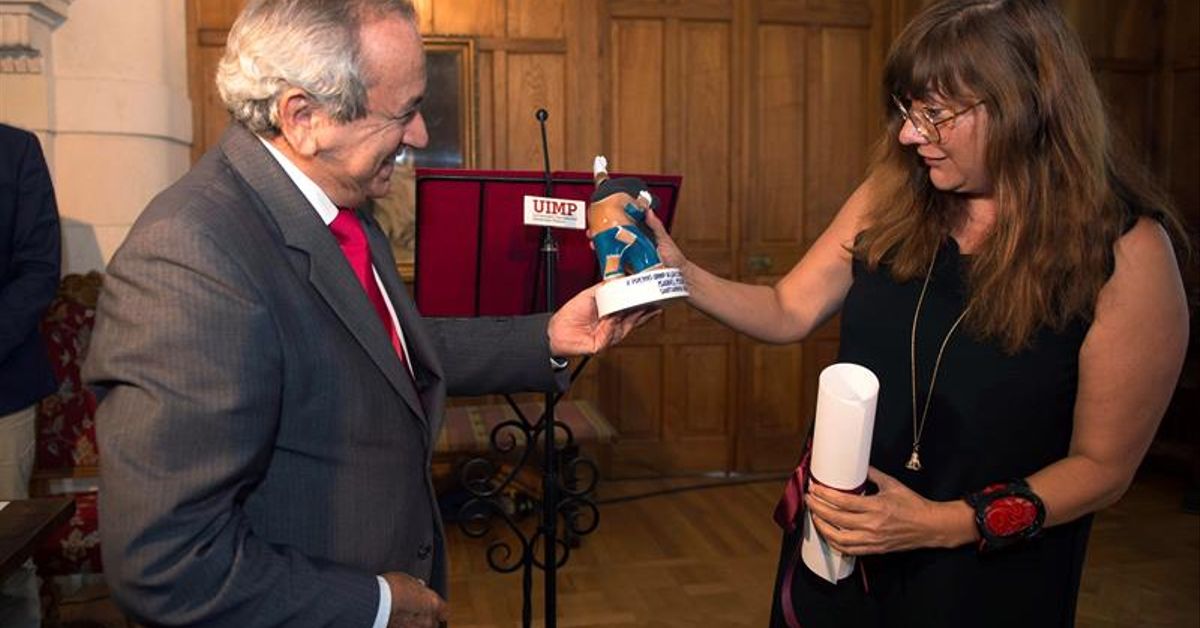The Universidad Internacional Menéndez Pelayo grants the annual honorary UIMP Award for Cinematography as an institutional distinction for the standout career of national and international cinematographers who have most contributed to the promotion and knowledge of cinematography, and enriching cinematographic heritage.
The candidates for the award are proposed by the UIMP Vice-Chancellor. The award is granted by the Governing Council after a taking a secret ballot and attaining an absolute majority.
The accolade itself comprises a reproduction of a symbolic object from the world of cinema and a diploma issued by the Vice-Chancellor of the UIMP stating the year when the award was granted.
2024 Award: Eduardo Noriega
 |
The actor Eduardo Noriega (Santander, 1973) has participated in 65 audiovisual productions filmed in 25 years, in 4 different languages and in 17 countries in 3 continents. He has made 42 feature films, nine short films, six commercials, and four series and documentaries. During his film career he has won eminent awards: Best Actor in 1994 at the AICA Contest for Luna, by Alejandro Amenábar and Best Actor at the Alcalá de Henares Festival for the same film. In 1998 he was nominated for the Goya Award for Best Actor in a Leading Role for Abre los ojos, while in 1999 he won Best Actor at the Aguilar de Campoo Festival for Allanamiento de morada, Best Actor at the Menorca Festival for La Fuente Amarilla; and a Special Mention at the Malaga Spanish Film Festival, shared with Paco Martínez and Pepón Nieto, for Allanamiento de morada; and the Shooting Stars Award from the European Film Promotion. He also received the 2001 European Revelation Award from Le Studio at the Cannes Film Festival; and in 2005, he was nominated for the Goya Award for Best Leading Actor for El Lobo, a film for which he was also nominated for Best Leading Actor at the Barcelona Film Awards. In 2009, the Spanish Actors Union nominated him for Best Supporting Actor for Transsiberian; in 2012, he achieved the Zapping Awards for Best Actor for Homicide; in 2013, he won at the Miami Film Festival the Grand Jury Prize for the cast of A Gun in Every Hand; and in 2017 he was nominated for Best Male Performance in Drama for The Sonata of Silence, at the MiM Series Awards. |
2023 Award: Alejandro Amenábar
 |
Alejandro Amenábar (Santiago de Chile, 1972) is a film director, screenwriter, and composer. Winner of, among many other awards, nine Goya Awards, an Oscar, and a Golden Globe, he has written the screenplays for his seven films and composed almost all the soundtracks for them. A student of the Faculty of Information Sciences at the Complutense University of Madrid, since his feature film debut with Tesis in 1996, Alejandro Amenábar has connected with audiences and critics alike. Tesis won seven Goya awards, including Best Film, Best Original Screenplay and Best New Director, and was a huge international success, winning numerous awards at festivals around the world. Just a year later, Abre los ojos, his second film, opened the doors of North American cinema. Los Otros (2001) and Mar Adentro (2004) consolidated his international reputation. Mar Adentro, starring Javier Bardem, won the Oscar and the Golden Globe for Best Foreign Language Film, as well as numerous international awards. Los Otros, starring Nicole Kidman, was his first film shot in English and was a remarkable success with audiences worldwide and was highly acclaimed by international critics. In 2009 he released Ágora, starring Rachel Weisz, which became the highest-grossing film of the year in Spain. In 2015 he returned to film Regresión in English with Ethan Hawke and Emma Watson. Mientras dure la guerra (2020), with Karra Elejalde and Eduard Fernández, is his triumphant return to cinema in Spain. The film, one of the most successful films that year, won five Goya Awards. In 2021, Alejandro Amenábar directed his first fiction series; La Fortuna, inspired by the graphic novel El tesoro del Cisne Negro by Paco Roca and Guillermo Corral. |
2022 Award: José Sacristán
 |
José Sacristán (Chinchón, 1937) is a film, stage and television actor who has had a renowned wide-ranging career. He is one of the most recognisable faces and voices in Spanish cinema from the last six decades, receiving an Honorary Goya from the Spanish Academy of Motion Picture Arts and Sciences and the National Cinematography Award. He won the Silver Shell at the 1978 San Sebastián Film Festival for Un hombre llamado Flor de Otoño (A Man Called Autumn Flower). He has also been awarded the following prizes: Honorary Award from the Actors Guild, the Honorary Feroz, five Silver Fotogramas, the National Theatre Award, the Ceres Award from the Mérida Festival, a Golden TP, an Ondas Award and a Silver Condor from Argentina. Sacristán has worked with some of the top Spanish film-makers, including the late Luis García Berlanga and Fernando Fernán-Gómez, as well as current figures such as Carlos Vermut, Isaki Lacuesta and Javier Rebollo. He has also been behind the camera as director on Soldados de plomo (Lead Soldiers), Cara de acelga (Silver-Beet Face) and Yo me bajo en la próxima, ¿y usted? (I Get Off at the Next Stop, What About You?). |
2021 Award: Gracia Querejeta
 |
Daughter of famed producer Elías Querejeta, Gracia Querejeta is a renowned film director who has worked across cinema and television. She debuted as an actor at the age of 13 in ‘Las palabras de Max’ by Emilio Martínez Lázaro. This was her springboard into the world of cinematography. She quickly began working as a director’s assistant. A graduate in geography and history from the Complutense University in Madrid, she took supplementary training in dance. She co-wrote and directed her first short film, ‘Tres en la marca’, in 1987, winning the Arriaga Theatre Award at the Bilbao Festival. From there, she had a brilliant career as a screenwriter and director of works including: ‘Invisibles’ (2020) ‘Siete mesas de billar francés’ (2017) and ‘Tanto monta’ (2017) (where she acted as director and screenwriter); ‘Txintxorro’ (2016) and ‘Cordelias’ (2014) (short films she has directed); and television series such as ‘AnaTramel’ (2020) and ‘Madres’ (2019). Throughout her career, Querejeta has received many awards, including: the Silver Shell for best screenplay at the 2007 San Sebastián Festival for ‘Siete mesas de billar francés’; the Golden Biznaga at the Malaga Film Festival for best film in 2015 for ‘15 años y un día’; and awards for best film, script, director, music and production from the Cinema Writers Circle in 2004 for ‘Héctor’. |
2019 Award: Francisco Delgado
 |
Born in Lanzarote (Canary Islands), Francisco studied at the Barcelona Institute for Theatre and went on to study on the Motley Theatre Design Course in London (1993-1994). During his time living in London, he worked in the West End and collaborated on Spanish productions as an assistant to Lala Huete and Sonia Grande. His debut as principal designer came on ‘La comunidad’ by Álex de la Iglesia, who he also worked with on ‘800 balas’. He collaborated with Pedro Almodóvar on ‘La mala educación’. He made the leap into international cinema alongside Alejandro González Iñárritu with ‘Biutiful’. He also collaborated with Jean Paul Gaultier for Almodóvar’s ‘La piel que habito’. Paco Delgado was nominated a Goya award in 2011 for ‘Balada triste de trompeta’ by Álex de la Iglesia and in 2021 for Almodóvar’s ‘La piel que habito’. He has won two Goyas, for ‘Blancanieves’ (2012) and ‘Las brujas de Zugarramurdi’ (2013). He has also been nominated for international awards including Best Costume Design at the Academy Awards for his work on ‘Les Miserables’ and ‘The Danish Girl’ (2016) by Tom Hooper. |
2018 Award: Isabel Coixet
 |
Isabel Coixet Castillo (San Adrián de Besós, 1960). Isabel Coixet began making home movies when she was given an 8mm camera for her first communion. After graduating in history with a specialisation in the 18th and 19th centuries from the University of Barcelona, she worked in advertising and copywriting. She won many awards for her adverts and finally set up her own production company in 2000—Miss Wasabi Films. She debuted as a screenwriter and director in 1988 with ‘Demasiado viejo para morir joven’, a film that was nominated at the Goya Awards for Best New Director. She made her first English-language film in 1996 entitled ‘Things I Never Told You’. An emotional drama with a cast of US actors led by Lili Taylor and Andrew McCarthy, the film led to her second nomination at the Goya Awards, this time for Best Original Screenplay. Coixet then collaborated with a French production company and in 1998 returned to Spanish screenwriting with an historical adventure story—‘A los que aman’. International success arrived in 2003 with the intimate drama, ‘My Life Without Me’, based on a short story by Nancy Kincaid, where the young Canadian actress Sarah Polley played Ann, a young mother who decides to conceal her terminal illness from her family. The Spanish-Canadian co-production was praised at the Berlin International Film Festival. Coixet worked with Polley again on a new film, ‘The Secret Life of Words’ in 2005, also starring Tim Robbins and Javier Cámara. The film won four Goya awards: Best Film, Best Director, Best Production and Best Screenplay. |
2017 Award: José Luis Alcaine
 |
José Luis Alcaine Escaño (Tetuán, 1938) is a director of photography and a pioneer in the use of florescent tubes as principal lighting in the 1970s. He is a member of the San Fernando Academy of Fine Art. His immense film work has led to five Goya Awards for best photography, from a total of 18 nominations. His fifty-two years in the profession have enabled him to see the evolution of cinema photography and technological development: ‘In the early days, you filmed, then came lighting, then control with 35mm monitors and, finally, digital photography.’ ‘Everything is definitely better now’, states the lighting pioneer in using reflections from umbrellas or fluorescent lights: ‘Despite the heavy criticism received for these innovations, today all film productions use them.’ |
Previous editions
| YEAR | EDITION | AWARD-WINNER | |
| 2016 | VIII | Miguel Marías | Film critic |
| 2015 | VII | Joséfina Molina | Filmmaker |
| 2014 | VI | Manuel Gutiérrez Aragón | Filmmaker |
| 2013 | V | José Luis Garci | Filmmaker |
| 2012 | IV | Alberto Iglesias | Musician and composer |
| 2011 | III | Carlos Saura | Director |
| 2010 | II | José Luis Borau | President of SGAE |
| 2009 | I | Marisa Paredes | Actress |





